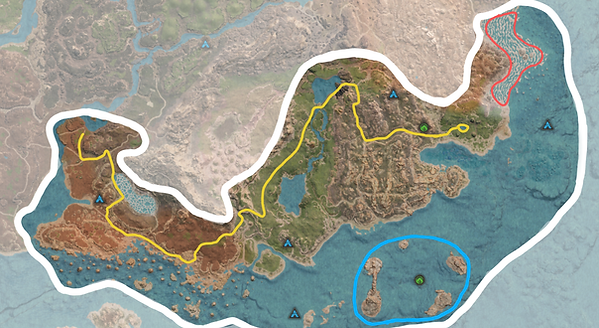
SITE JULIETT
EARLY CRETACEOUS EUROPE
ENVIRONMENT
Site Juliett is composed of a small cluster of islands with a wide range of different environments: from shallow seas to cliffs, from arid forests to misty wetlands.
Based on Early Cretaceous formations of England and Spain, this site is highly water-oriented with a focus on land-sea interactions while exploring some of the first known dinosaur genera.
NOTE TO RESEARCHERS
The ideal habitat of each species - i.e. the environment it it most commonly found in - is expected to be followed as part of the profile. Beach-dwelling animals have had their thirst drain greatly decreased so they should very rarely need to drink.












SEASONAL VARIATION
Site Juliett has a significantly more stable environment, being subtropical with warm temperatures and plenty of water year-round. There are always fish and plenty of edible plants on the map.
THE WET SEASON
THE DRY SEASON
The wet season is characterised by distinctively more rain, meaning resources are more plentiful.
-
In game we simulate this by turning off the water quality system and placing down more food.
During the dry season Site Juliett experiences significantly less rainfall. While there is usually still enough water to go around competition typically heats up between semi-aquatic species.
-
The water quality system is turned on during the dry season.
However, such high volumes of water brings with it the risk of floods.
Long periods with little rain means the land is often very dry and therefore prone to wildfires.
MAP OF THE SITE
Our research team has compiled a detailed map of the Site and areas of animal behaviour for your use! Please see below a satellite image, with indications of key areas and where major migration routes have been observed.

DEEP WATER
Adult Machimosaurus will often head out into deep water to fish. Females will also attempt to find a mate in the open ocean.
DEMANDASAURUS NESTING GROUND
Demandasaurus seem to have long memories, returning to the same area to court and nest year after year.
IGUANODON MIGRATION ROUTE
This route is the one most commonly taken by Iguanodon herds. Solitary individuals will use this intuitive knowledge to find others of their species.